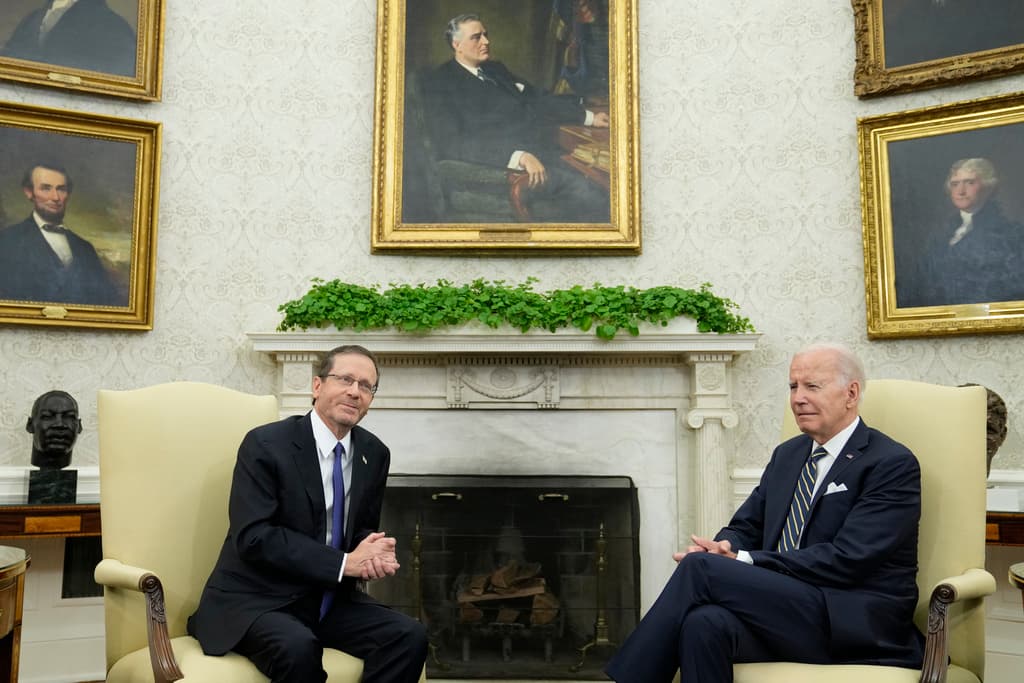Biden’s Dilemma: Support Israel or Back Anti-Zionist Democrats
The White House often opines on Israel’s political turmoil over Prime Minister Netanyahu’s efforts to weaken the country’s supreme court. At the same time the president is navigating the turmoil over supporting Israel within his own party.

President Biden’s self-professed life-long support of Israel is increasingly coming into conflict with his other, much more profound loyalty: his Democratic Party, which has powerful members who proudly define themselves as anti-Zionist.
“As I confirmed to Prime Minister Netanyahu yesterday, America’s commitment to Israel is firm and is ironclad,” Mr. Biden told a White House guest, President Herzog of Israel, on Tuesday. Addressing the political turmoil in Israel, Mr. Herzog acknowledged that “we are going through pains.” Yet, he added, “Israeli democracy is sound, strong, and resilient.”
Many Democrats increasingly doubt that’s true, and they dislike Israel. A March Gallup poll asked Americans if they sympathize more with Israelis or Palestinians, and 49 percent of Democrats said the latter, while 38 percent supported Israel. On the Republican side, 78 percent sympathized with Israel, while 11 percent sided with the Palestinians.
The White House often opines on Israel’s political turmoil over Mr. Netanyahu’s efforts to weaken the country’s supreme court. At the same time Mr. Biden is navigating the turmoil over supporting Israel within his own party.
While several Democrats are trying to hold firm to the party’s traditional pro-Israel stance, others wear their hatred on their sleeves. Mr. Biden’s attempts to reconcile between anti-Zionists and traditional supporters of Israel at times seems as challenging as Mr. Herzog’s attempts to get Israeli politicians to compromise over the judicial overhaul proposal.
Mr. Biden is “walking a tightrope between his own instincts and the reactionary politics of the hard left,” a vice president for research at the Foundation for Defense of Democracies, Jonathan Schanzer, tells the Sun. “He’s constantly triangulating and calculating. I don’t think this is an easy thing for him to do.”
Republicans on Tuesday teed up a resolution condemning the House Progressive Caucus chairwoman, Pramila Jayapal, who said over the weekend that Israel is a “racist” state. “These are just multiple Democrats on multiple times consistently saying antisemitic remarks, and this has got to stop,” Speaker McCarthy told reporters, adding that Democrat leaders “should take action against their own.”
In a letter, a group of 42 Democrats led by Representative Josh Gottheymer, most of them Jewish, indeed said they were “deeply concerned” over Ms. Jayapal’s words. After many others denounced her, Ms. Jayapal issued a long retraction on Monday. Yet, a day later she retweeted a defense of her initial anti-Israel remarks by a New York Times columnist, Michelle Goldberg.
Mr. Biden has catered to anti-Israel Democrats by consistently denigrating Mr. Netanyahu’s government as being made up of “extremists.” More pointedly, while often highlighting his history of supporting Israel since Golda Meir was prime minister, Mr. Biden kept Mr. Netanyahu at arm’s length. While denouncing what he called Israel’s weakened democracy, he has feted anti-democratic leaders like President Erdogan of Turkey.
“Just asked U.S. President Biden if Netanyahu is being invited to the White House. His answer: ‘yes,’” an Israeli television reporter, Neria Kraus, tweeted in Hebrew on Tuesday. Press Secretary Karine Jean-Pierre, though, declined to confirm that report afterward, saying instead that the two leaders will meet on American soil later this year, and that the details are yet to be worked out.
Many have speculated that the meeting, if it happens at all, would take place on the sidelines of the September gathering of the UN General Assembly, when the president traditionally meets world leaders at a clip resembling speed dating.
American presidents have long cherished White House meetings with Israeli leaders as a political respite from contentious Washington battles. At the height of President Obama’s struggle with Mr. Netanyahu over the 2015 Iran deal, the Israeli premier visited the White House regularly. Mr. Biden, in contrast, has often made the opposite point by defiantly telling reporters that he won’t have Mr. Netanyahu at the White House.
After addressing the Israeli Knesset earlier this year, Speaker McCarthy said that if Mr. Biden fails to invite Mr. Netanyahu to the White House, the Israeli premier would be invited to the Hill instead.
By and large Democrat politicians remain in Israel’s corner. As the country’s 75th anniversary approached last year, Mr. Herzog, whose role is ostensibly ceremonial, was invited by Speaker Pelosi to address a joint session of Congress. Mr. McCarthy later renewed the invitation.
Yet, several Progressive Democrats announced they would boycott Mr. Herzog’s Wednesday address. “In solidarity with the Palestinian people and all those who have been harmed by Israel’s apartheid government, I will be boycotting President Herzog’s joint address to Congress,” Representative Rashida Tlaib, tweeted. So will Representatives Alexandria Ocasio-Cortez, Cori Bush, and Jamaal Bowman. Ms. Jayapal is yet to decide if she would join them.
Mr. Biden is “not in a good position,” a former Israeli ambassador at Washington, Michael Oren, told the Times of Israel. As the 2024 election nears, he added, “I would imagine that one of his biggest fears is that the progressive wing of the Democratic Party would put up its own campaign.”

